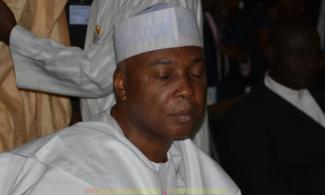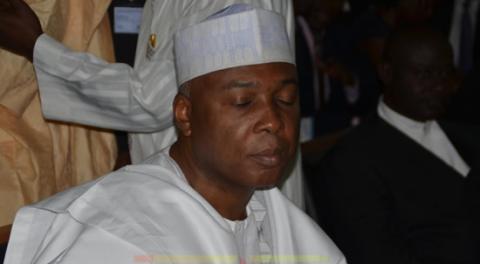
Samuel Madojemu, who heads the Intelligence Department of the Code of Conduct Bureau (CCB), yesterday explained that the agency had no need to invite Senate President Bukola Saraki to respond to questions before the bureau filed a case at the Code of Conduct Tribunal (CCT) against the two-term former governor of Kwara State. The decision not to summon Mr. Saraki for interrogation was due to the face that the senator had already submitted sworn legal documents.
According to Mr. Madojemu, the bureau’s investigation into Mr. Saraki’s financial transactions during his tenure as governor did not originate from any specific petition. He stated that the CCB had received no petition against Mr. Saraki, adding, however, that the bureau’s investigation was triggered by “complaints and intelligence supplied by the Attorney General of the Federation.” He added that the CCB and EFCC “decided to collaborate to ensure detailed investigation of infractions discovered in [Mr. Saraki’s] assets declaration form.”
Under cross-examination, Mr. Madojemu disclosed that, prior to the communication with the Office of the Attorney General of the Federation, the bureau did not have any petitions against Senator Saraki.
Mr. Madojemu, who is a major prosecution witness, made the disclosures during cross-examination by Senator Saraki’s lead defense counsel, Kanu Agabi. Responding to one of Mr. Agabi’s questions at Mr. Saraki’s renewed trial, the CCB official remarked that the former governor’s asset declaration form constituted a sworn statement.
He told the tribunal that the CCB did not invite Mr. Saraki for questioning on account of the fact that the former governor’s asset declaration form was a statement on oath. He emphasized that Mr. Saraki had “already made a statement on oath in his assets declaration form.”
“It is not compulsory to invite a declarant for an interview,” he told the tribunal, headed by Justice Danladi Umar. He also stated other ex-governors were also investigated in the same manner as Senator Saraki.
The CCB’s investigator revealed that he collaborated with a team of investigators at the Economic and Financial Crimes Commission (EFCC) to scrutinize former Governor Saraki’s asset declaration form, adding that investigators detected inconsistencies in the declaration form.
Mr. Madojemu stated that the agents who worked on Mr. Saraki’s case received verbal instructions to commence their investigation. In addition, he disclosed that the investigative team also received verbal briefing on the terms of reference to guide their work.
Mr. Madojemu told the tribunal that, upon the completion of their task, the investigators verbally briefed the EFCC chairman on the outcome of their findings. In response to the defense counsel’s question, the CCB witness stated that he had not seen reports written on other former governors who also underwent investigation.
The prosecution witness told the court he was not present when the Attorney General of the Federation briefed the chairman of the Code of Conduct Bureau about the EFCC’s investigation of inconsistencies in Mr. Saraki’s asset declaration. He also disclosed that, even though he was “familiar with the assets declaration of the declarant,” he was “not totally familiar with all aspects of the exhibits tendered before the court.” He told the CCT that he was not part of a team of investigators who in 2006 scrutinized Mr. Saraki’s 2003 asset declaration.
Mr. Madojemu’s cross-examination is scheduled to continue when the trial resumes on March 22, 2017.
